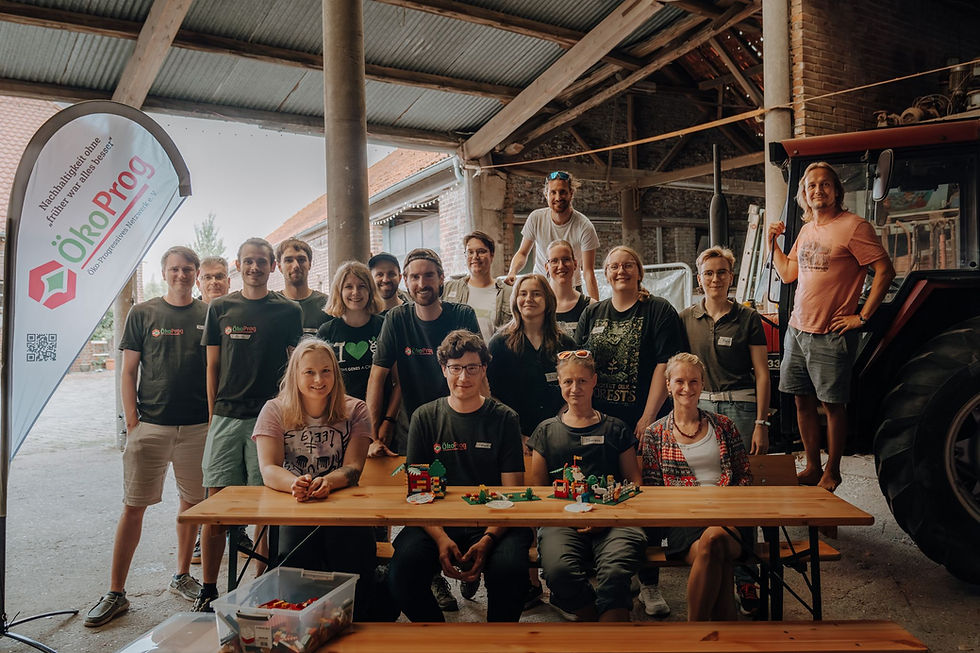Global Nature Fund Conference
- Taskscape Associates
- May 26, 2025
- 4 min read
Updated: Jul 2, 2025
Biodiversity-sensitive farming means more than just flower strips...
On the 20th May 2025, we were pleased to be invited to attend a conference in Frankfurt, 'More Than Just Flower Strips', organised for the EU LIFE project 'Insect-Responsible Sourcing Regions' (IRSR).

With 40% of global insect species now threatened, their project seeks to tackle this alarming decline through innovative landscape-level approaches, bringing together around 60 demonstration farms across Germany and Italy with food companies of all sizes, as well as NGOs and policymaking bodies.
Overlaps with FRAMEwork's research and pilot initiatives mean it was fantastic to be invited to present the project, and its Recodo platform, as well as participate in panel discussions. The opportunity to learn from attendees' experiences, discuss broad issues and consider case studies in breakout sessions was also valuable for the delegation from partners the James Hutton Institute and Taskscape.
FRAMEwork's Contribution
Project Coordinator Dr Graham Begg (JHI) presented an overview of FRAMEwork in the morning session. Dr Begg emphasised that transforming agriculture requires moving beyond isolated interventions to embrace system-wide, collaborative approaches rooted in local communities and supported by proper facilitation and resources. He opened by establishing the context of agriculture's role in global biodiversity loss through habitat simplification and intensification. This was followed by an explanation of ways current conservation efforts, particularly Agri-Environment Schemes, often prove insufficient due to their farm-level focus, inflexibility and lack of monitoring feedback. Moving to solutions, Dr Begg explored successful collaborative models worldwide, including UK Farmer Clusters, Australian Landcare, Dutch cooperatives and New Zealand's Greening Waipara initiative, highlighting how landscape-scale collaboration encourages ecological restoration and farmer-led innovation.

His presentation then detailed FRAMEwork's three-tier approach: Farmer clusters at the grassroots level, supporting resources and tools in the middle tier and overarching scientific and policy integration at the top. Dr Begg offered practical insights from the project's 11 pilot Farmer Clusters across 10 European countries, discussing the challenges of forming and managing clusters, from identifying lead farmers to securing funding and achieving meaningful collaboration. He then presented encouraging data from Clusters showing improved ecological understanding and enhanced ability to deliver biodiversity outcomes, while acknowledging increased workloads. The presentation concluded with an introduction to Recodo, the project's digital information hub, from Theo Simmons (Taskscape), which explored its design, resources, uptake and key learnings.
Presenters in the morning sessions also included Dr. Andreas Gumbert, DG Environment at the European Commission, who attended remotely, offering EU-wide perspectives on the protection of pollinators and Patrick Trötschler and Jule Huber, of the Lake Constance Foundation and Georg-August University Göttingenand, who explained the LIFE IRSR and the KOOPERATIV Projects. All in-person speakers were invited to participate in a short panel discussion to close the morning, with interesting questions posed to Dr Begg on the details of piloting the UK Farmer Cluster model in Europe and to Theo Simmons on stakeholder perspectives and the role of media in science communication.

Afternoon sessions featured four parallel breakout sessions, each focusing on different aspects of biodiversity enhancement. These included exploring high-potential agricultural measures and landscape connectivity, examining municipal innovations that combine biodiversity with public engagement, discussing citizen science approaches for biodiversity monitoring and investigating new financing strategies for biodiversity in food production. The English-language session on financing strategies was particularly interesting for project attendees.
Following a networking break, afternoon sessions concluded with a panel discussion featuring four representatives from business, agriculture and research institutions discussing "Responsible Sourcing Regions in Europe - How Can We Mainstream Landscapes Approaches, Measures and Incentives?". From the project, Theo Simmons (Taskscape) participated as a speaker alongside Andrea Schwalber, Nestlé Germany & Food for Biodiversity, Marek Bingel, Ecoland & Bäuerliche Erzeugergemeinschaft Schwäbisch Hall and Prof. Dr. Nils Borchard, from the DLG's Competence Centre for Agriculture and Food. It turned out to be an interesting discussion ranging from the panellists' favourite foods all the way up to big issues like AI uptake and securing financing for ecosystem resilience in a world increasingly re-focused on global security issues and expanding profits.
The day's panel discussions and broader programme were excellently moderated by programmer Patrick Trötschler and the Global Nature Fund's Managing Director Udo Gattenlöhner, who welcomed attendees and closed the conference with a positive summary looking towards the future.
Engagement and Impact

Attended by almost 100 people across Europe's NGO, research and business community the conference proved a great knowledge exchange opportunity. Reciprocal social posts before and after the event also helped raise awareness of FRAMEwork and other attending initiatives. Following the conference, members of the project's leadership team co-signed a letter to EU Policymakers. This document was drawn up jointly by the five partners in EU LIFE IRSR across agriculture, nature conservation and the food industry. It summarises key action requirements for the sustainable promotion of biodiversity in Europe.



